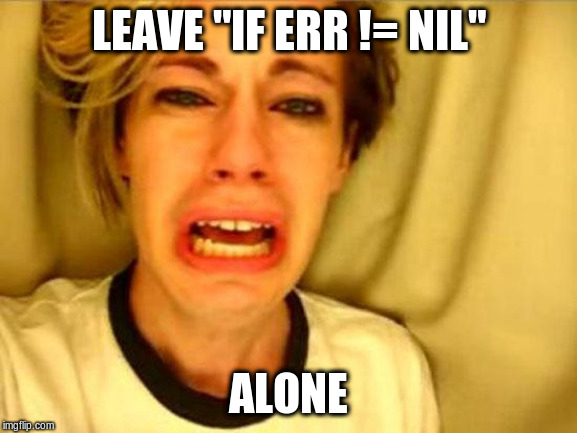I like the error checking as-is, but if this is truly an issue that must be solved, I think a new keyword is probably a better solution. Any solution will likely involve control flow changes, and it's best to make that as obvious as possible.
In this example, the on condition is evaluated every time err is set.
func example() (foo int, err error) {
on err != nil {
return foo, err
}
foo, err = calcThis()
foo, err = calcThat(foo)
return
}This works without declaring names for return values in the function signature, as well.
func example() (*int, error) {
var err error
on err != nil {
return nil, err
}
foo, err = calcThis()
foo, err = calcThat(&foo)
return &foo, nil
}This could also be set multiple times. Here's a contrived example:
func example() (*int, error) {
var err error
on err != nil {
return nil, err
}
foo, err = calcThis()
on err != nil {
return &foo, err
}
foo, err = calcThat(&foo)
return
}To my eyes, this retains Go's style and readability, while making it clear what is happening at each step (once you understand the paradigm), since it is effectively inserting that condition after each occurrence of err being set.
You could even do the following:
func example() (foo int, err error) {
var message string
on err != nil {
return foo, errors.Wrap(err, message)
}
message = "failed to calc this"
foo, err = calcThis()
message = "failed to calc that"
foo, err = calcThat(foo)
return
}Finally, this has applicability beyond error handling. Want to return if foo == 0? Another contrived example:
func example(i int) bool {
on x == 0 {
return false
}
x = calcSomeInt(i)
return true
}
The Go2 proposal #32437 adds new syntax to the language to make the
if err != nil { return ... }boilerplate less cumbersome.There are various alternative proposals: #32804 and #32811 as the original one is not universally loved.
To throw another alternative in the mix: Why not keep it as is?
I've come to like the explicit nature of the
if err != nilconstruct and as such I don't understand why we need new syntax for this. Is it really that bad?